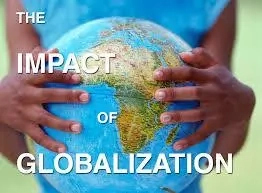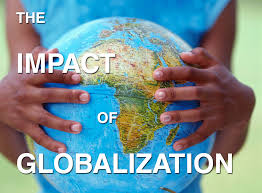Globalization: What Does It Mean?
Globalization as a term has been described as a lot of things in different contexts. It is generally used to describe the integration of various national economic models into a primarily capitalist economic model to be adopted globally, thus fostering free trade and rapid economic development.
Read Also: What is the best money making business in Nigeria

In an economic context, it is often used interchangeably with international business.
International business refers to cross-border trade of commodities and services between two or more countries. Globalization, on the other hand, encompasses international business and a lot more.
According to Carol M. Kopp, it is the distribution of products, services, technology, information, and jobs across national borders and cultures. It describes the interdependence of countries in economic and socio-cultural issues.
It also describes a shift toward an integrated global marketplace where the commodities being traded are not just goods and services but include social exchanges of culture, ideas, and beliefs.
Read Also: What are the good strategic marketing plan for a business
Globalization: How Does It Affect Businesses?
Globalization of business refers to the change a business undergoes in transitioning from a single-country entity to a multinational entity.
It can be classified into two major categories: product globalization and market globalization.
Production globalization refers to the acquisition of raw materials and manufacturing processes from other nations in order to take advantage of cheaper labor and lower raw material prices in those nations.
To illustrate: A clothing manufacturer purchases fabric from one country, ships the fabric to another country to complete the production process, and then ships the finished products to yet another country for the marketing, distribution, and sales process to begin.
This allows the manufacturer to reduce the cost of production. This reduction in production costs allows the manufacturer to sell the products at lower prices to consumers while increasing profits.
Market globalization refers to the removal of trade barriers between countries, thus allowing producers to market and sell their goods and services easily to other countries. It usually involves tariff reductions and faster international transport routes.
It involves a lot of planning, tweaking of marketing and advertising campaigns, and execution on a company’s part because factors such as the target country’s culture and financial capability play a big role in determining how well-received the product will be.
In some cases, it is industry-specific. For example, a Western female clothing manufacturer would do well to rethink analyze its marketing strategy and products before launching in a market like the Middle East while a mobile phone manufacturer can get by with a few minor tweaks to the product and marketing in order to sell anywhere worldwide.
Globalization plays a vital role in the strategies and business practices employ to remain competitive and profitable in the global marketplace today. Having said that, it has its benefits and drawbacks which will now be discussed.
Read Also: Discuss extensively how legal environment impacts on hotel business in Nigeria
Benefits
Economies of scale: These are reductions in overall production costs that occur when companies increase production.
It works well for large corporations when fixed costs like administration are spread out over increased units of production. It allows large companies to operate at full capacity while reducing costs. (Globalization has negative impacts on businesses as well, 2016, p. 4.
Innovative technological growth: As globalization spreads, new businesses are being established and taking advantage of the perks it offers.
This increases the competition and promotes innovative advancements in technology particularly as FDI (foreign direct investment) increases, thus allowing processes to become more efficient. (Milken Institute. “Globalization of the World Economy,” p. 9.
Increased living standards in developing countries: Globalization allows developing countries access to job opportunities that come up when businesses set up part or all of their manufacturing, production, and distribution processes in such nations.
This increases the average household income and taxes remitted, thus boosting economic development and increased living standards.
Read Also: What is the best way for getting customers for your online business??
Drawbacks
Monopolization and inequality: As large corporations expand their global footprints by taking advantage of increased technological advancement, cheaper labor, and economies of scale, it becomes easier for them to enjoy monopolies in certain industries in developing nations.
Equity distribution: Economically advanced nations, corporations, and individuals have the advantage when it comes to technologically advanced production processes and distribution networks.
As such, the financial rewards that come from applying these resources to globalized businesses can be unfairly concentrated on such entities, thus increasing the economic inequalities between the haves and have-nots.
Global interdependence: As global trade practices become more streamlined and uniform, nations increasingly rely on one another for trade support and economic development.
This can result in dire financial problems for other nations when an economic downturn occurs in one country. An example of this is the domino effect that shook the “PIGS” during the global financial crisis of 2008.
The acronym PIGS refers to Portugal, Ireland, Greece, and Spain. In 2008, the economies of the above-named nations were severely hit due to the fact that they were inextricably linked commerce-wise.
So, a crisis in the economy of one of them acted as a trigger for the near-total collapse of the others. Being members of the European Union, they, along with other debt-ridden European nations, were bailed out by the union.
Conclusion
While the pros and cons of globalization will be debated for decades, one thing is clear: it is not going anywhere anytime soon. Dani Rodrik, the author of “Straight Talk on Trade: Ideas for a Sane World Economy,” published in the quarterly Milken Institute Review in late 2017, argued that while globalization is a given, a balancing of the phenomenon is needed in order to restore labor’s voice while protecting job and income stability and focusing global attention on areas where the greatest economic gains can be found.
It has been suggested by economists that international investments are no longer geared towards building capital infrastructure but rather to find countries with the lowest taxation rates.
While globalization in one form or another is inevitable, as evidenced by its role in global economic development, the challenges it has faced, such as economic crises and political maneuvers also suggest that constant change is the way forward.
Read Also: What are the good strategic marketing plan for a business
References
Collins, M. (May 2015). ‘The pros and cons of globalization.’ Retrieved from Forbes.
Dani R. ‘Straight Talk on Trade: Ideas for a Sane World Economy,’ Milken Institute Review, p. 9.
UKEssays. November 2018.
Globalization Has Negative Impacts on Businesses as well. Economics Essay. [online]. Available from: https://www.ukessays.com/essays/economics/globalization-has-negative-impacts-on-businesses-as-well-economics-essay.php?vref=1 [Accessed 26 March 2020].






